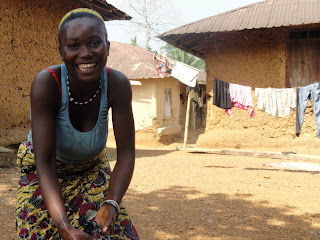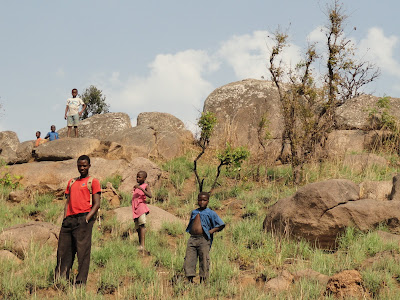 Daru village is very off the beaten path. The village is located very near to the Liberian border right on the edge of the Gola Forest. When we arrive we are instantly swarmed by kids, who are very affectionate and have no "awareness of body and space"--Crystal and Edward, that was for you. Seriously though, I have never been more physically touched at one time by so many hands...it was a little overwhelming. They were very interested in Matt's beard and my fingernails. They lead us by the hands to their school, down a winding path through the forest.
Daru village is very off the beaten path. The village is located very near to the Liberian border right on the edge of the Gola Forest. When we arrive we are instantly swarmed by kids, who are very affectionate and have no "awareness of body and space"--Crystal and Edward, that was for you. Seriously though, I have never been more physically touched at one time by so many hands...it was a little overwhelming. They were very interested in Matt's beard and my fingernails. They lead us by the hands to their school, down a winding path through the forest.  Then we hang out on the porch of our house and sing songs, play games, and learn numbers and other Mende phrases. We now know how to say hello, how are you, I'm fine, how did you sleep, and yes in Mende. Although that might be my limit, Matt is brilliant with new languages and knows more than me. They have given us African names, and although no one but us finds it humorous here...they named Matt, "Jo", and me, "Mama", so we are Jo Mama!
Then we hang out on the porch of our house and sing songs, play games, and learn numbers and other Mende phrases. We now know how to say hello, how are you, I'm fine, how did you sleep, and yes in Mende. Although that might be my limit, Matt is brilliant with new languages and knows more than me. They have given us African names, and although no one but us finds it humorous here...they named Matt, "Jo", and me, "Mama", so we are Jo Mama!After our first night, we find that our expectation of what it would be like in a small rural village is very, very wrong. This village LOVES music, dancing, and boomboxes. From about 9-midnight, a huge boombox blasts popular music and many kids, babies, parents, and grandparents gather in the square right outside our house to dance the night away. We have pretty much memorized the 10 songs they have in their tape that plays over and over. Earplugs.....priceless.
We came to Daru through WWOOF, and planned on doing farming. After one week, we have done a cumulative 1.5 hrs worth of farming. But, we aren't complaining. Being in the village is relaxing and peaceful. The sun is really hot here, so people mostly try to stay out of it as much as possible! We love taking walks to nearby villages, keeping our eyes out for monkeys jumping through the trees.
One day we went to a neighboring village to pick up machetes that we ordered (for bushwacking) and instead ended up witnessing a cultural dance that was part of an initiation ceremony for a women's society. I really enjoyed hearing live singing and percussion. Live music has been conspicuously absent in our travel so far. We've gotten very aquainted with a select few radio hits, but this was the first singing I've heard. The music was really fresh though, rhythms I've never heard before.
This is a photo of cassava leaves that are found in the Daru garden. They are used to make cassava leaf plassas/dishes that are really yummy, although I prefer potato leaf. The tubers found underground are also eaten, and frequently. They are bright white on the inside and on the outside have a brown thin bark-like cover. Otherwise they look remarkably like a sweet potato or yam. Cassavas can be eaten raw, or cooked a variety of ways. I will really miss eating cassava!
On Wednesday, we did some fishing. It seemed as if almost everyone in the village was participating. In the morning Alex, myself, and a small group of men went in to the bush to find the "medicine," a vine that grew in one part of the forest. We chopped some and brought it back to the river. On the river bank, everyone beat the vines, either whipping them against rocks or hitting them with thick sticks, until they began to fray.
The threads of the vines were pulled apart and then soaked in the river. We're not 100% sure why, but we think that some chemicals in the vine make the fish lethargic. As the medicine was working its way through the water, all the women hopped in to the river with nets (hand-made rope woven around a stick frame) and picked out every last tiny fish in the river.
Compared with some of the huge catches we saw on the coast, this river has more modest offerings, but they've been tasty. One fish was electric and I got a shock when I touched it.
One night we awoke to terrible wailing, a man in tremendous anguish. In the morning we were told that his two-year old child had died. Nicholas, a German volunteer who's been staying in the village for the past four months, said that it's the second infant to have died during his stay. Apart from this incident, I think we've both been struck by how disengaged the parents seem from their children, at least by American standards. It seems that once they can walk, the parents entrust them to 'the village'--following around their barely older siblings.
Here are some photos that I love from our time in Daru:
When the surrounding villages came to Daru for a ceremony/festival, everyone dressed up in their nicest clothes, gathered together for dancing and singing, met for religious reasons, and enjoyed each others company.
Alex, Alpha (our host in Daru) and Matt with our new machetes!
Me using my new machete in the field clearing a plot of land for planting. Even though it is the dry season, the land is very wet here, so the earth is build up around motes of water, which is then scooped up and tossed over the planted ground for watering every morning during the driest months. Working with a machete is a lot harder than it looks!
Fati became a fast friend of mine in Daru. She has a four month year old son and is constantly doing the laundry! Here she does her usual morning laundry for about 20 minutes....when Matt and I do our laundry it takes us significantly longer and the villagers all gather around and laugh at us. :)
Some kids. The baby is Fati's baby. It is very common for kids to scoop up babies and then be "in charge" of them for a while while the mother is busy, for example, doing the laundry.
Here, "the commando" as he likes to call himself, holds up a HUGE bug for us to see.
A typical woman in Daru. She's just picked vegetables and will keep them balanced on her head as she walks where she needs to go, with her child firmly strapped to her back.
Alpha's son, Abu, is only two years old. He loves to grab onto my legs and hold my hand when I walk everywhere.
Matt watches boys play on our porch. Our porch is never empty...the kids come to see us and play. When we don't want to play, they will play with each other.





































